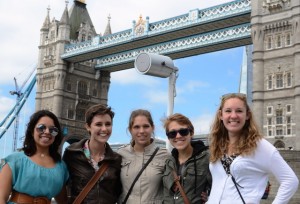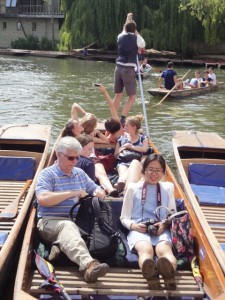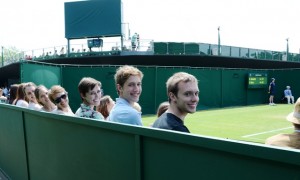The United States and the United Kingdom have very different cultural attitudes and approaches to funding healthcare. For students who are interested in a career in medicine or a related field, understanding those differences can be a valuable part of their college education.
Over the summer, several Lafayette students were able to study the strengths and weaknesses of each country’s healthcare system through a unique interim abroad program that combines an academic course, Ethical and Social Issues in Healthcare in the UK and the U.S., with student internships at healthcare or human services workplaces in London.

Students visit the Tower Bridge.
Tight curricular demands can make it difficult for students pursuing medicine, dentistry, or veterinary science to find the time to study abroad.
“I got that study abroad experience by living and interning in London over a two-month time frame, but had the advantage of not missing out on a semester here at school,” says psychology major Gabrielle Henault ’14 (Millersville, Md.).
The course is taught by Stephen Lammers, Manson Professor of the English Bible Emeritus, and Alan Childs, professor of psychology.
“Hopefully, the students begin to understand that modern western societies struggle with similar issues around the delivery of healthcare and that both the U.S. and the UK are going through large changes as they respond to those issues with their different cultural values,” Lammers says.
Students learned that general practitioners take a more central role in managing individuals’ healthcare in the UK, while the U.S. places more emphasis on patient choice. And in the U.S., costs to provide healthcare are much higher.
“The students always find it interesting that both cultures, while very critical of their own healthcare processes, will at the end of the day proclaim their system to be the best, and cannot ever imagine swapping systems,” Childs says.

The class relaxes during a gondola ride.
Lammers and Childs stress in the class that the goal of the program is not to determine which system is the best. Rather, students are encouraged to study and debate the issues.
“At times they do become frustrated with the apparent illogical aspects of our system of healthcare financing, and they come to see possible improvements, but do understand better how the current system came to be. I think that kind of insight will make them much better practitioners, and certainly consumers, of healthcare,” Childs says.
The internship portion of the program gives students the chance to learn about the UK’s healthcare system from the inside. The experience should prove helpful as they continue their education in medical fields.
“Our students who are interviewed by graduate medical and healthcare admissions committees tell us that this program is often one of the first, and often the only topic of conversation during the admissions conversation,” Childs says.
Henault interned with Mencap, a charity that provides advocacy and job skills training for people with learning disabilities.
“I thought I wanted to go into social work before I went to London, but I was also considering a career in something such as public health, which would involve more behind-the-scenes, policy-type work. I wanted to experience what it is like to work more behind the scenes. I loved the people and the environment at Mencap, but my internship helped me to confirm that working as a social worker in a clinical setting is the best career path for me,” she says.
Psychology major Megan Kaveney ’15 (Westfield, N.J.) interned with Salusbury WORLD Refugee Center, a charity organization that assists children at a primary school highly populated with refugee children. It provides support and helps them to integrate into society through after-school programs to socialize with other kids from similar backgrounds. Staff give advice for the families as well.

Class members watch a tennis match during Wimbledon.
“This was a great way to interact with people from countries like Somalia, Iraq, Iran, and Afghanistan who recently moved into the London area. Most families came from countries experiencing tragedy so they were grateful for the help that the organization provided. It was great to see the parents of these children putting so much effort into helping their kids succeed in a new environment,” Kaveney says.
Although she is still unsure about her plans after Lafayette, she says the interim abroad program was a great way to help her explore her options.
In addition to the coursework and internships, students learned about British culture and history through visits to museums and historical sites, including Stonehenge, Cambridge University, and the British Museum.
Working alongside British citizens in their internships also helps the students get a feel for British culture.
“For eight weeks, they lived and worked as citizens of London, taking the Tube, remembering to bring something to read on the journey, learning that forgetting your brolly will mean that you are likely to get wet, and that the pub culture means so much more than drinking,” Childs says.


